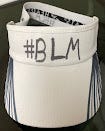...If it ain't sayin' nothin'. - Searching for My Voice and Meaning
I first learned about Vollequality last night when a few coaches I follow on Twitter posted about it. Reading and understanding their mission doesn't take long. But understanding my own mission has not been as straightforward. To be clear, this post is not about their mission. I support them completely. I have signed their pledge. This post is about my relationship with social justice, commitment, and meaning.
The title of this post is part of a line from a Public Enemy song called "He Got Game" (from the 1998 Spike Lee movie of the same name). The full (NSFW) line is "It might feel good, it might sound a little somethin' But f*ck the game if it ain't sayin' nothin'". I have recalled that line often over the past few of months as I have looked for a place in the larger social struggles that are being highlighted by the nightly news. What good have I achieved by yelling at my television? My game ain't sayin' nothin'. I have to do better than that. But what is the next step?
Vollequality is asking me to sign a pledge and get the word out. It's a positive step, right? You bet it is. So why does taking that step bother me? I don't think it is a discomfort with what they ask me to represent. If anything, it is a discomfort with the idea that I may let myself off the social justice hook after telling my social media followers that I "did" something. Hashtag activism like that bothers me. It can be long on chatter and short on change. It's not the movement's fault if I post something on Instagram and call it good. That's all my fault. It's about where I set my own standards for caring about something. It's about moving up the "change" axis however I can. I decide what it means to be committed to a cause. I am free to choose if and how I talk about the things I care about. I choose to interpret the discomfort I feel to mean that my commitment must go beyond a tweet. But that's not the end of my introspection. (The drawing comes from Jessica Hagy's Indexed, which is awesome.)
If I want to care more deeply, then what does that look like for me? Whether I am completely happy about it or not, the first step for me is just to talk about it. Talking about equality, equity, racism, sexism, ableism, etc. is uncomfortable already and that is an important obstacle to overcome. But then there is the personal obstacle of discussing matters that are personal and/or private. These two obstacles, though separate, are regularly intertwined in my life. I don't like to talk about much of anything on social media so what do I do when it's time to talk about how I feel about social justice? I don't know how to do it but I have to commit to doing it. And screwing it up. And working it out. And trying again. But, like I have told many an athlete in my care, we're not going to get better at it by not doing it.
So what good is just talking about it? By itself, it doesn't feel like much to me but I can contribute to making social justice something that gets talked about by just talking about it. Inspiring others is one of my core beliefs so I view this as a chance to inspire others to care a little more about what matters to them. Maybe, as we talk more about social justice we can begin to understand it, and by extension, each other a little more.
And what about my need to feel like I'm doing something? I have found little things to begin stretching myself out. Sometimes it is consumerism disguised as activism. I've ordered stuff from Free Hugs Project (which may be the saddest shirt to wear during a pandemic), Black Lives Matter, and a brewery participating in the Black is Beautiful collaboration. (For an interview with the brewer who started this, check out the excellent Share a Pint podcast.) I have added my pronouns to my email signatures as well as to any presentations I make. I try to ask good questions and then listen to what people want to tell me. And then I've been donating to different causes.
For me, this started around Ahmaud Arbery's murder. Reading about him helped me realize how much I take running, which I do often, for granted. So decided to take a thing that is comfortable for me and make it uncomfortable. I decided to donate a dollar to BIPOC causes for every mile I run this year. I also added BLM to the visor I wear when I run. Now I am invited to think about how others view me while I am out there. I wonder if they think positively or negatively of me. In my mind, I beg them to think about it. This is nowhere near what it's like to be Black and I have to think about that out there too.
It's never going to be enough. The work is never done. But that also means that I can spend every day doing a little more work. Maybe I'll raise a little hell before I'm finished. Maybe we can do it together.




